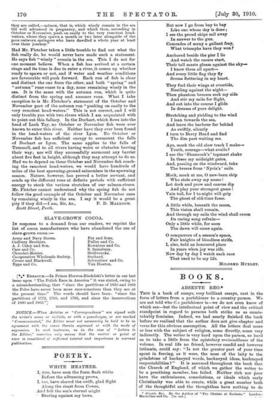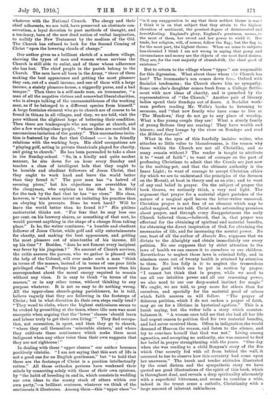BOOKS.
ABSENTE REC.* Tam is a book of essays, very brilliant essays, cast in the form of letters from a parishioner to a country parson. We are not told who tLe parishioner is—we do not even know of which sex—but the intellectual point of view and the critical standpoint in regard to persons both strike us as unmis- takably feminine. Indeed, we had nearly finished the book before we realised that the author does not give chapter and verse for this obvious assumption. All the letters deal more or less with the subject of religion, some directly, some very indirectly. The writer is very hard upon the parson, so hard as to take a little from the epistolary vraisemblance of the volume. In real life no friend, however candid and however intimate, could say : "Is not the greater part of your time spent in forcing, as it were, the nose of the laity to the grindstone of hackneyed words, hackneyed ideas, hackneyed respectabilities P" It is assumed throughout the book that the Church of England, of which we gather the writer to be a practising member, has failed. Neither rich nor Poor have the enthuthasms, consolations, or ideals which early Christianity was able to create, while a great number both of the thoughtful and the thoughtless have nothing to do
• Absents Roo. By the Author of '" Pro Christ° et Eccleaia." London :
Macmillan Mid Co. Da net.] . _
whatever with the National Church. The clergy and their chief adherents, we are told, have preserved an obstinate con- servatism, a loyal devotion to past methods of thought, and a tendency, born of the now dead notion of verbal inspiration, to nullify the New Testament by the medium of the Old. The Church has refused to look for the Second Coming of Christ "upon the lowering clouds of change."
Our author gives us a brilliant sketch of a modern village, showing the types of men and women whose services the Church is still able to enlist, and of those whose adherence she has lost. The chief people in the parish belong to the Church. The men have all been in the Army, " three of them making the best appearance and getting the most pleasure they can, out of a small income, and one of them with a large income, a stately pleasure-house, a niggardly purse, and a bad temper." Then there is a self-made man, an ironmaster, " a man of all the negative virtues and somewhat liberal charities, who is always talking of the unreasonableness of the working man, as if he.belonged to a different species from himself." A large feminine element who go to church are of course to be found in this5as in all villages, and they, we are told, visit the poor without the slightest hope of bettering their condition. Then there are tradespeople who are regular at church, and also a few working-class people, "whose ideas are moulded in unconscious imitation of the gentry." This unconscious imita- tion is fostered by the fact that Colonel — is in friendly relations with the working boys. His chief occupations are "playing golf, acting in private theatricals played for charity, and going to church." He has been persuaded to take a class in the Sunday-school. " So, in a kindly and quite modest manner, he sits down for an hour every Sunday and teaches a class of intelligent lads that they ought to be humble and obedient followers of Jesus Christ, that they ought to work hard and leave the world better than they found it." The poor man has " a hatred of seeming pious," but his objections are overridden by the clergyman, who explains to him that he is fitted for the task by the fact that he has "no vices." His class, however, is " much more intent on imitating his practice than on obeying his precepts. Does he work hard ? Will he leave the world better than he found it ? " His pitiless caricaturist thinks not. " For fear that he may lose one per cent. on his brewery shares, or something of that sort, he would prevent anything in the shape of a change from taking place." Is he, the writer continues, "a humble and obedient follower of Jesus Christ, while golf and silly entertainments for charity, and making the beat appearance, and getting the most pleasure out of nine-tenths of • his income, fill up his time " ? Besides, " does he not foment every incipient war fever by his jingoism P " No amount of Church services, the critic assures the parson, who we gather is pleased with the help of the Colonel, will ever make such a man " think in terms of the masses, instead of in terms of one poor little privileged class." Perhaps the parson knows more than his correspondent about the moral energy required to remain without any vices. It is easy to think "in terms of the masses," or in any other terms, without thinking to any purpose whatever. It is not so easy to do nothing wrong. All the upper-class church-going parishioners, he is told, believe vaguely that they are following in the footsteps of Christ ; but in what direction do, their own,steps really tend? "They wend to clubs, where the highest enthusiasm seems to be evoked by grumbling at-the taxes, where idle men wax most energetic when arguing that the lower' classes should learn and labour truly to get their own living." They find occupa- tion, not recreation, in sport, and then they go to church, " where they call themselves miserable sinners,' and where they cultivate those sentiments which make, them most indignant when any other voice than their own suggests that they are not righteous ! "
In dealing with these "upper classes our author becomes positively vitriolic, "I am not saying that this sort of life is not a good one for an English gentleman," but " to hold that these are the footsteps of Christ is a position intellectually rotten." All these orthodox persons have weakened their minds by consorting solely with those of their own opinions, by "the habit of .breeding in and in, which consists in wedding our own ideas to the• scanty stock of others within our own party,"—a brilliant sentence, whatever we think of the sentiments it illustrates, Among them—this "upper class "- "is it any exaggeration to say that their noblest theme is war ? I think it is on that subject that they attain to the highest elevation of sentiment, the greatest degree of disinterested and heroie.feeling. England's glory, England's greatness, means, to the most of them, her sword and her power to wield it. Her trade, her religion, will, of course, follow the flag ; but the flag is, for the most part, the highest theme. When we come to subjects less elevated I think I am not wrong in saying that pomp and circumstance and money are the objects of our most fixed desires. They are, for the vast majority of church-folk, the chief good of existence."
But to return to the village whose " types " are responsible for this digression. What about those whom t!:e Church has lost? The ironmaster's son comes down fro::, Oxford with Socialist tendencies ; the Church shows him no sympathy. Some one else's daughter comes fresh from a College Settle- ment with new ideas of charity, and is quenched by the representatives of " the Church." Another pair of literary ladies spend their Sundays out of doors. A Socialist work- man prefers reading Mr. Wells's books to listening to sermons, and "that new family who have come to live at The Meadows,' they do not go to any place of worship. What a fine young couple they are! What a sturdy family of young Britons they are rearing ! They have wealth and leisure; and they lounge by the river on Sundays and read the Hibbert Journal."
What in the eyes of this fearfully incisive writer, who attaches so little value to blamelessness, is the reason why those within the Church are not all Christlike, and so many remain without ? The reader is taught to attribute it to "want of faith" ; to want of courage on the part of professing Christians to admit that the Creeds are just now in the melting-pot, and that the ultimate authority is the Inner Light ; to want of courage to accept Christian ethics (by which we are to understand the principles of the Sermon on the Mount), at least in theory and as an aim ; and to want of any real belief in prayer. On the subject of prayer the book throws, we seriously think, a very real light. The argument that prayer for a material object partakes of the nature of a magical spell leaves the letter-writer unmoved. Christian prayer is not free of an element which may be called magical, we are told. Christ made astounding promises about prayer, and through every disappointment the early Church believed them,—believed, that is, that prayer was effectual for the obtaining of spiritual and material benefits, for obtaining the direct inspiration of God, for obtaining the necessaries of life, and for increasing the mental power. No one, least of- all the author of Absente Rea, supposes that we dictate to the Almighty and obtain immediately our every petition. No one supposes that by strict attention to the laws of health we can ensure it to ourselves or our children. Nevertheless to neglect those laws is criminal folly, and in nineteen cases out of twenty health is attained by attention to them. No less folly is it to neglect the tremendous force for good which can be put in motion by prayer. " I cannot but think that in prayer, while we need to use all our intuitive power and all our reasoning power, we also need to use our deep-seated instinct for magic." We ought, we are told, to pray more for others than for ourselves, and specially for the material good of others which faith assures us will follow. " The prayer of dolorous petition, which I do not reckon a prayer of faith, may go on for a lifetime in hysterical egotism." This is a harsh saying, but the writer tells a story which counter- balances it. " A woman once told me that she had all her life had urgent reason to petition God for two material benefits, and had never received them. Often in indignation she would demand of Heaven the reason, and listen to the silence, and try to convince herself that God was not.'; Living among agnostics, and accepting no authority, she was amazed to find her belief in prayer strengthening with the years. "One day, when she was reading to a child Bunyan's story of the fire which One secretly fed with oil from behind the wall, it occurred to her to observe how this certainty had come upon her unawares." The harsh and tender attitudes illustrated by the cruel dictum and the sympathetic story we have quoted are good illustrations of the spirit of this book, which is throughout dual, and reveals a deep spirituality alternately with a superficial bitternessf and seems to combine a wide, indeed in the truest sense a catholic, Christianity with- a large amount of inherent unkindness.







































 Previous page
Previous page